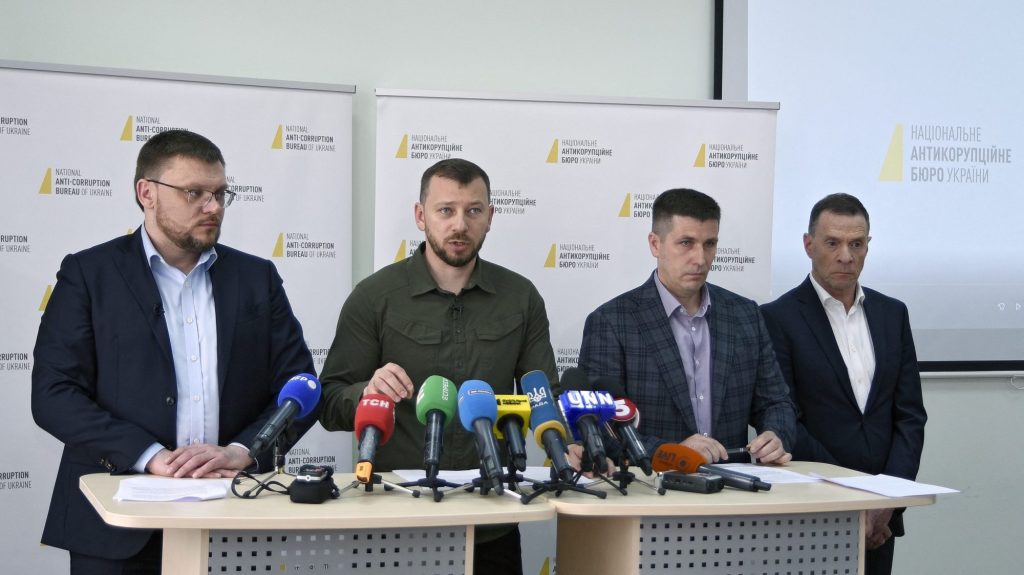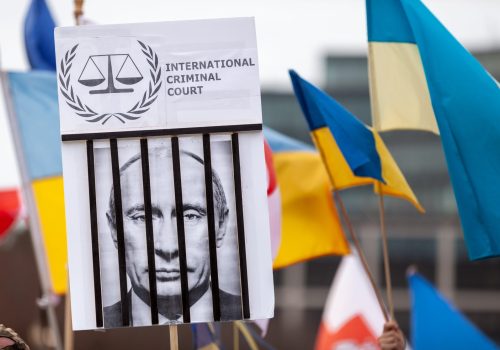The head of Ukraine’s Supreme Court, Vsevolod Kniaziev, was detained in mid-May on corruption charges based on an alleged $2.7 million bribe. The charges were brought by Ukraine’s leading anti-corruption bodies, the Special Anti-Corruption Prosecutor’s Office (SAPO) and National Anti-Corruption Bureau of Ukraine (NABU). This landmark case reflects the considerable progress made in Ukraine’s struggle against corruption within the judiciary, while also highlighting the key issues that must still be addressed in order to create a rule of law environment that will allow Ukraine to prosper.
The charges against Kniaziev are not entirely unprecedented. In the three-and-a-half years since the creation of Ukraine’s High Anti-Corruption Court, 23 judges have been convicted. Anti-corruption investigations have also led to changes in Ukraine’s judicial infrastructure, such as the liquidation of the controversial Kyiv District Administrative Court, which had long been a focus of major anti-corruption probes.
In summer 2022, Ukraine’s anti-corruption efforts received a boost with the appointment of Oleksandr Klymenko as new head of the Specialized Anti-Corruption Prosecutor’s Office in line with Ukraine’s obligations regarding EU candidate country status. Klymenko’s appointment was widely seen as a watershed moment that signaled an end to the collective sense of impunity within the Ukrainian establishment. The recent arrest of the Supreme Court head has confirmed that earlier reform failures are not irreversible. It is now important to draw the right conclusions as Ukraine looks to finalize the reform of judicial governance bodies and repair the country’s Constitutional Court.
Stay updated
As the world watches the Russian invasion of Ukraine unfold, UkraineAlert delivers the best Atlantic Council expert insight and analysis on Ukraine twice a week directly to your inbox.
The relaunch of Ukraine’s Supreme Court was one of the initial efforts to reform the country’s widely discredited judiciary in the initial aftermath of the 2014 Revolution of Dignity. However, it did not produce the desired results as a number of factors robbed the court of true independence. Unreformed judicial governance bodies were tasked with hiring Supreme Court judges, with civil society offered a superficial role in the selection process and Ukraine’s international partners largely standing aside. As a result, civil society observers assessed that around a quarter of all selected candidates were questionable.
The creation of the High Anti-Corruption Court in 2017-2019 was a more positive experience, with all candidates scrutinized by an independent panel composed of international experts. This paved the way for the cleansing of two judicial governance bodies, the High Council of Justice and the High Qualification Commission of Judges, with foreign experts once more playing a crucial role.
In January 2023, Ukraine appointed eight new members to the country’s key judicial governance body, the High Council of Justice (HCJ), thereby enabling it to resume its work. On June 1, the HCJ appointed new members to the High Qualification Commission of Judges (HQCJ), which is another significant step forward. However, it is important to highlight that no agents of change from civil society were appointed, while two of the new members have questionable reputations. The next challenge is for the HQCJ to finish qualification assessments and hire judges to fill more than 2,500 vacancies. In addition, further measures are also expected in order to restore public trust in the Supreme Court.
Eurasia Center events

The next big issue on the path toward rule of law and EU accession is the selection procedure of Constitutional Court judges. EU candidate country status has opened up an historic opportunity to repair the Constitutional Court, which has long wielded effective veto power over any reform efforts in Ukraine. Reforming the Constitutional Court is widely seen as the most politically challenging element of judicial reform for the Ukrainian government to implement.
Additionally, some anti-corruption initiatives that were justifiably put on hold following the start of Russia’s full-scale invasion must now be revived. This includes asset declarations for all state officials. The recent bribery charges brought against the head of the Supreme Court underline the urgency of a return to the asset declaration submission and verification process. Concerns regarding this issue have recently been voiced by the International Monetary Fund and EU Ambassador to Ukraine Matti Maasikas.
An independent judiciary and the rule of law have long been recognized as vital pillars for Ukraine’s future success. As the country looks toward the post-war recovery period, these factors are now more important than ever. During the rebuilding process, Ukraine’s partners will demand transparency and security for all state and private sector investments. Additionally, judicial reform has a central role to play in Ukraine’s further EU integration. Crucially, creating a fair legal environment free from corruption is also a key demand of Ukrainian society, including the hundreds of thousands currently defending the country against Russian invasion.
Olena Halushka is a board member at AntAC and co-founder of the International Center for Ukrainian Victory.
Further reading
The views expressed in UkraineAlert are solely those of the authors and do not necessarily reflect the views of the Atlantic Council, its staff, or its supporters.

The Eurasia Center’s mission is to enhance transatlantic cooperation in promoting stability, democratic values and prosperity in Eurasia, from Eastern Europe and Turkey in the West to the Caucasus, Russia and Central Asia in the East.
Follow us on social media
and support our work
Image: National Anti-Corruption Bureau (NABU) Director Semen Kryvonos, Special Anti-Corruption Prosecutor's Office (SAPO) head Oleksandr Klymenko, SAPO prosecutor Oleksandr Omelchenko, and head of NABU's second unit of detectives Borys Indychenko attend the briefing on the exposure of large-scale corruption in the Supreme Court of Ukraine, namely the scheme for receiving undue benefits by the Supreme Court leadership and judges, Kyiv, capital of Ukraine, May 16, 2023. (Kaniuka Ruslan/Ukrinform/ABACAPRESS.COM)




